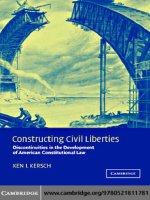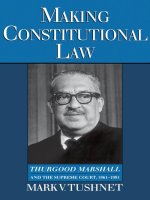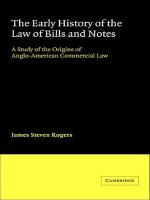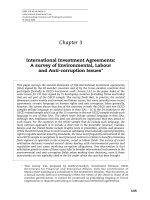Vietnam constitutional law: development orientationestablishment and development orientation
Bạn đang xem bản rút gọn của tài liệu. Xem và tải ngay bản đầy đủ của tài liệu tại đây (398.94 KB, 13 trang )
<span class='text_page_counter'>(1)</span><div class='page_container' data-page=1>
VIETNAM CONSTITUTIONAL LAW: ESTABLISHMENT AND
DEVELOPMENT ORIENTATION
<b>Dr. Phan Thanh Ha</b>
Institute of State and Law, Vietnam Academy of Social Sciences
<b>Abstract</b>
The establishment and development of the Vietnamese Constitutional Law science is associated
with the development stages of the Constitutions. These are: (1) The period from 1945 to 1986:
an important opening stage of the Constitutional Law science, institutionalizing the ideas about the
State and law, civil rights, people’s life, and so on into the regulations in the Constitutions of 1946,
1959 and 1980. (2) From 1986 to 1992: marking the development of Vietnam Constitutional Law
Science during the Doi Moi period, with the birth of the Constitution of 1992 and the increase in
research on state power, state management, democracy, and People’s right to mastery. (3) From
1992 to 2013: The period during which Vietnam Constitution Law Science focused on clarifying the
role and meaning of the provisions of the Constitution and the law as a basis for comprehensive
renewal of social life in the country. (4) From 2013 to present: featuring research on the provisions
of the new Constitution and organizing the implementation of the Constitution. While pointing out
the approach, research methods and research forces, the authors of this article also shed light
on the content of the research on the Constitutional Law science in each period based on which,
some major research directions for the Vietnam Constitution Law science in the new period are
suggested.
Due to historical circumstances, from 1954 to 1975, Vietnam was divided into two regions, with
two different political regimes. In the framework of the paper and research conditions, the authors
will only mention the scientific history of the Constitutional Law of the Democratic Republic of
Vietnam (from 1946 to 1976) and the Socialist Republic of Vietnam (from 1976 to the present).
<b>Keywords: </b>Constitutional Law, Vietnam, research orientation
<b>Introduction</b>
Since its establishment until now, studies in the field of constitutional law in Vietnam have
demonstrated remarkable developments, contributing significantly to the country‘s legal science in
terms of both legal doctrine, ideology, and practical applications.
</div>
<span class='text_page_counter'>(2)</span><div class='page_container' data-page=2>
ASIAN CONSTITUTIONAL LAW: RECENT DEVELOPMENTS AND TRENDS
318
Therefore, in this report, for the convenience of readers and analysis, we divided the development of
Vietnam‘s Constitutional Science into four stages as follows:
Overview of the development of Vietnam Constitutional Law
<b>1. The period from 1946 to 1986</b>
The period from 1946 to 1980 can be considered as the establishment stage of the Constitutional
Law science in Vietnam. Due to the war, followed by the period of peace, reunification and
reconstruction of the country under embargo, conditions for academic research and development
were not favourable. Opinions and ideas in the form of published research works, particularly in the
field of legal science, were scarce. Therefore, research studies in the constitution law science in this
period were mainly based on the contents of the Constitutions.
This period can be considered the time when ideas about the State and law, civil rights, people‘s
life... were institutionalized into the provisions of the Constitutions of 1946, 1959 and 19801<sub>. In </sub>
particular, humankind‘s progressive ideas about the organization of the state apparatus, the basic
rights of citizens ... about the determination, the general election, the equality of all citizens before
the law... were selectively absorbed and embodied in the Constitution of 1946. “Vietnam Constitution
of 1946 reflected the spirit of both Western constitutionalism and Marxist-Leninist constitutionalism.
This model of government bore the influences of all the three constitutional, governmental models
existing at that time in the world: two Western constitutional models of government, which
were the presidential (the head of state is simultaneously the embodiment of the state, leads the
Government, and has veto power) and the cabinet (the cabinet is established by parliament, and
can be disapproved by the parliament); and Soviet republic government model under the
Marxist-Leninist constitutionalism (People‘s Parliament has ultimate authority and cannot be disbanded; the
Government is the administrative agency)”2<sub>. </sub>
However, since the Constitutions of 1959 to 1980, “the triumph of Marxism-Leninism is evident
in Vietnam”3<sub>. Accordingly, the constitution was conceived “as a form of orientation, consolidating </sub>
power, not a form of power restriction like Western constitutionalism”4<sub>. The Constitutions of this </sub>
period “had very few tools to limit power, such as: the constitutional rights of the people, the human
rights as a limit to the state power, constitutional jurisdiction, the separation of powers, the system
of checks and balances, the confidence regime... Instead, these Socialist Constitutions had many
contents to consolidate and orientate state power: constitutional rights belong to the state (the National
Assembly as the legislature), socialist centralized rights, the constitution aimed to build socialism,
citizen rights with socialist orientations (especially the economic, cultural and social rights), the
regime of Socialist-oriented economics, the court is the instrument of the state, and conducts trials on
behalf of the State”5<sub>…</sub>
1 Bui Nguyen Khanh (project manager), Ministerial-level project “<i>Basic theoretical and practical issues of establishing </i>
<i>a socialist rule-of-law State in the period from now to 2020</i>” (Institute of State and Law, Hanoi, 10/2010) 64.
2 Bui Nguyen Khanh (project manager), ibid, 65.
3 Bui Nguyen Khanh (project manager), ibid, 74, 75.
4 Bui Nguyen Khanh (project manager), ibid, 74, 75.
</div>
<span class='text_page_counter'>(3)</span><div class='page_container' data-page=3>
319
VIETNAM CONSTITUTIONAL LAW: ESTABLISHMENT AND DEVELOPMENT ORIENTATION
<i><b>1.1. The period from 1986 to 1992</b></i>
Since the Communist Party launched the Doi Moi reform, converting the central planning and
subsidized economic mechanism to a market economy mechanism, opening up, attracting foreign
investment and creating conditions for the private sector to develop, the economic model and
organizational and operation model of the state apparatus under the 1980 Constitution increasingly
showed their inadequacies and backwardness, and was no longer suitable to the new development
situation, and therefore a radical innovation was essential. The need to establish a Constitution for the
Doi Moi period became more urgent than ever.
Studies in the field of constitutional law in this period clearly reflected these needs of the country
in these contents: legal issues related to the establishment and revision of the Constitution of 1992,
reforming the state apparatus, legal issues related to ownership during the transition from a planned
economy to a socialist-oriented market economy... Human rights studies also began to receive more
attention and achieved remarkable results, laying the foundations for the later human rights research.
Research studies on the leadership role of the Party with the state, or the relationship between the
Party leadership, the State management, and People mastery were always at the centre of interest. The
first and foremost important task of the legal and scientific researchers in Vietnam was to build, develop
and perfect the system of theoretical and practical points of view to establish the country’s political
system, providing evidence for arguments and solutions concerning the establishment, renovation
and perfection of an appropriate political system to ensure the full realization of the people‘s power,
under the leadership of the Communist Party of Vietnam and the effective management role of the
State. The classic work in legal science in this period is the monograph of Sc. D. Dao Tri Uc “Our
state and law in the cause of innovation”, Social Science Publishing House, H., 1997, which “bring
new perceptions of the State and the law as well as arguments for the needs, directions, solutions for
the innovation of State and laws in Vietnam”1<sub>...</sub>
In addition, other notable studies worth mentioning were: The ministerial-level project
(Ministry of Justice) led by Nguyen Van Thao, titled “Scientific and practical arguments for the
establishment of Vietnam’s constitution in the current period”. HN. 1990; the ministerial-level project
titled “Reforming the organizational structure and operating mechanism of the state apparatus of the
Socialist Republic of Vietnam in the transition period”, National Academy of Public Administration,
led by Doan Trong Tuyen. HN, 1990; the ministerial-level project (Ministry of Justice) led by Nguyen
Tat Vien, titled “Judicial reform – renovating the organization and operation of people’s courts”, HN,
1990...
Notably, studies on human rights had started to gain special attention. An outstanding one
was the KX.07 project by the Human Rights Research Center of the National Academy of Public
Administration, Hanoi, titled “Conditions to ensure human rights and civil rights in the national
renewal process”, led by Assoc.Prof.Dr. Hoang Van Hao from 1991 - 1995...
Also during this period, Legal Sociology and Comparative Law became independent law
branches, which was marked by the birth of the Department of Legal Sociology and Comparative
House 2007) 102
</div>
<span class='text_page_counter'>(4)</span><div class='page_container' data-page=4>
ASIAN CONSTITUTIONAL LAW: RECENT DEVELOPMENTS AND TRENDS
320
Law at the Institute of State and Law - Vietnam Academy of Social Sciences in 19911<sub>, and was </sub>
considered a new turning point that promoted research in the field of Constitutional law in Vietnam
to a new height.
<i><b>1.2. The period from 1992 to 2013</b></i>
This period is marked by the birth of the Constitution of 1992 and was the preparation for the
birth of the Constitution in 2013. However, the amendment of the Constitution in 2001 also created
certain turning points, making slight divergence in Constitutional Law Science into two stages: the
period from 1992 to 2001 and the period from 2001 to 2013.
<i>From 1992 to 2001</i>
The new and breakthrough policies of the Party at the sixth and the seventh National Congress
together with the birth of the 1992 Constitution had created important innovations in all areas of society,
along with which, democracy was expanded, independent thinking was promoted, the creativity of
the people was highly appreciated. On that basis, legal science in general and Constitutional law
science in particular also experienced new developments. In addition to serving the implementation
of the Constitution in 1992, the content of research in the field of Constitutional law in this period
continued to focus on the basic theoretical issues about Constitution law, while also opened other
new directions, such as: theoretical and practical issues about politics and the political system; the
rule of law; human rights; civil society; administrative reform; judicial reform; ownership, ownership
regime, and so on.
The study of rights during this period was mainly approached from a civil rights perspective.
Studies of human rights were still quite scant. However, scholars had initially clarified the principle
and foundational issues in the field of human rights. Representative of these studies is the book titled
“<i>Human rights in the modern world</i>” by various authors, edited by Prof. Hoang Van Hao and Dr.
Pham Khiem Ich (Hanoi, 1995<i>)2<sub>. </sub></i><sub>In the field of civil rights, the concepts of rights were also researched </sub>
with open and multidimensional views, marking a new stage, the development of a socialist-oriented
market economy of the country stated in the 1992 Constitution. Research interests were no longer
limited to a number of political rights as before; economic rights, such as the ownership of citizens,
had also become the focus of research in this period, an example of which is the Associate Doctoral
thesis titled “Citizenship ownership right in Vietnam” by Ha Thi Mai Hien (1996).
Some of the notable studies whose foci were directly related to the Constitution were: Commentary
on the 1992 Constitution by Phan Trung Ly - Ha Thi Mai Hien (1992)3<sub>; studies on the constitutional </sub>
history by Nguyen Dinh Loc (1996)4<sub>, comparative studies on the Constitutions of the World, edited by </sub>
Dao Tri Uc (1992)5<sub>, Institute of Legal Science Study - Ministry of Justice (1992)</sub>6<sub>; the organizational </sub>
1 Pham Khiem Ich – Hoang Van Hao (eds), <i>Human rights in the modern world</i> (Institute of Social Sciences Information
publishing house, 1995).
2 Phan Trung Ly – Ha Thi Mai Hien, <i>Commentary on the 1992 Constitution</i> (Su that Publishing house 1992).
3 Dr. Nguyen Dinh Loc, <i>The birth and development of the Constitution in history</i> in Hanoi Law University, <i>Vietnam </i>
<i>Constitutional Law Textbook</i> (Education Publishing House 1996).
4 Dao Tri Uc (ed)<i>, Fundamental issues of Constitutions in the worlds</i> (Su that Publishing house 1992).
5 Institute of Legal Science Research - Ministry of Justice, <i>Constitutional Topic</i> (1992).
</div>
<span class='text_page_counter'>(5)</span><div class='page_container' data-page=5>
321
VIETNAM CONSTITUTIONAL LAW: ESTABLISHMENT AND DEVELOPMENT ORIENTATION
structure of various countries in the world by Vu Hong Anh (1997)1<sub>, Nguyen Dang Dung, Bui Xuan </sub>
Duc (1993)2<sub>; the election regime by Vu Hong Anh (1997)</sub>3<sub>.</sub>
At the same time, studies on Western “bourgeois” doctrines related to the field of Constitutional
law had become more and more prosperous in quantity and quality. The scope of research was also
broader and bolder. The issues previously considered sensitive, such as the theory of separation of
powers, had also begun to be studied (for example, “The doctrine of separation of powers and the
modern bourgeois State apparatus” by Dinh Ngoc Vuong (1992))4<sub>.</sub>
Regarding organization, the Constitutional Law had previously been called the Law of the State;
but during this period, it was called the Constitutional Law.
<i>From 2001 to 2013</i>
The period from 2001 to 2013 period was when the country entered the 21st century, opening
a new era. The 1992 Constitution indeed created a platform for the liberation of resources, the
promotion of creativity and intellectual capacity that had long been bound by extended war and the
centralized management subsidy bureaucracy mechanism. The effects of globalization together
with the process of reform, opening and integration had posed new challenges and opportunities
for the development process of Vietnam. Based on the Resolution of the 9th National Congress
(2001), amendment and supplement of the 1992 Constitution was adopted. For the first time,
“<i>market economy</i>” and “<i>rule of law</i>” had formally been institutionalized”5<sub>. Accordingly, for the </sub>
first time, the concept of “the rule of law State” was included in the Constitution: “The State of
the Socialist Republic of Vietnam is the Socialist rule of law State of the people, by the people,
for the people” (Article 2 of the 1992 Constitution, amended and supplemented in 2001). Along
with that was the affirmation of “building a socialist-oriented market economy” in Article 15 of
the 1992 Constitution, amended and supplemented in 2001. At the same time, in the organization
of state power, there was a supplemented principle: “State power is unified, with delegation of
power to, and coordination among State bodies in exercising legislative, executive and judicial
rights” in Article 2 of the Constitution.
The three reforms (administrative, judicial, legislative) conducted simultaneously also posed
urgent theoretical and practical issues for the country’s legal science address, firstly in the field of
Constitutional law. Subsequently, the requirement to continue amending and supplementing the 1992
Constitution began in 2011, opening up new tasks for legal science in general and constitutional law
science in Vietnam in particular.
Publishing house 1997);
1 Nguyen Dang Dung - Bui Xuan Duc, <i>Constitutional Law of Capitalist Countries Textbook</i> (Hanoi University
Publishing House 1993).
2 Vu Hong Anh, <i>Electoral system of several countries in the world</i> (National Political Publishing House 1997)
3 Dinh Ngoc Vuong, <i>Thedoctrine of the separation of powers and the modern bourgeois State apparatus</i> (Institute of
Social Sciences Publishing house 1992).
4 Prof. Dr. Thai Vinh Thang, ‘<i>Vietnam constitutional history</i>’ < />nghien-cuu-trao-doi.aspx?ItemId=14> accessed 22 July 2019.
</div>
<span class='text_page_counter'>(6)</span><div class='page_container' data-page=6>
ASIAN CONSTITUTIONAL LAW: RECENT DEVELOPMENTS AND TRENDS
322
In this context and on the political - legal basis, research in the field of Constitutional Law of
Vietnam in this period had made impresive developments.
Along with the theoretical and practical review of the promulgation and implementation of the
1992 Constitution amended and supplemented in 2001, studies continued to consolidate and improve
fundamental theoretical issues, and at the same time, opened up new research directions, touching
on issues that had not previously been investigated for different reasons. During this period, the
constitutional law science recorded a surge of research in fields that had been initiated in previous
periods (although still quite new) in Vietnam. The key words that were searched and frequently
mentioned in legal science in general and in the constitutional law science of Vietnam in particular
included: the rule-of-law state, assignment, delegation, supervision and control of power... Studies
also focused on clarifying theoretical and practical issues concerning the administrative, judicial,
and legislative reform. A more thorough and complete review of a number of doctrines, principles
of people’s sovereignty, constitutionalism... in this period had contributed to bringing the State’s
Constitution law science to a new height.
Research on these topics, had developed from merely a collection studies on foreign experience,
to remarkable achievements in this period, in terms of content, form, quantity and quality to the role,
value, and impact on Vietnamese legal science. It can be seen that the studies on the power control in
this period made the most direct scientific contributions to forming the argument for the establishment
of the principle of power control later added in the 2013 Constitution.
Many issues that used to be quite unfamiliar, even had previously been known as the “forbidden
zone” in legal sciences and in the Constitutional law science in Vietnam, also started to gain attention,
and contribute to major changes in political thinking as well as social awareness. These were issues
related to civil society, the state’s compensation responsibility, constitutional mechanisms, judicial
review... One outstanding achievement in this period was the study of human rights. The research in
this area had grown in width and depth, in the direction of increasing attention to the exploitation
and understanding of specific human rights. Some notable studies were on specific rights such as
referendum, freedom of association, right to information, and so on.
It can be seen that studies in Vietnam’s Constitutional law science have contributed to strengthening
and deepening basic theoretical and practical issues, and at the same time, played a part in introducing
and importing ideas, doctrines and experience related to the contents of Constitutional law from other
countries, thereby suggesting implementation and directions for Vietnam.
In terms of form, studies in the field of Constitutional law were increasingly diverse, from research
projects at all levels, to publications in specialized law journals, cooperation research projects, various
forums such as conferences, seminars, social networks, and so on.
</div>
<span class='text_page_counter'>(7)</span><div class='page_container' data-page=7>
323
VIETNAM CONSTITUTIONAL LAW: ESTABLISHMENT AND DEVELOPMENT ORIENTATION
Social Sciences, as especially shown in the research studies on «Human Rights» - multidisciplinary
and interdisciplinary approach in social sciences since 2009» within the Project: «Human rights
education forum for undergraduate and postgraduate» under the Public Administration and
Administrative Reform Program, under the Financing Agreement between the Danish Government
and the Vietnamese Government1<sub>.</sub>
Notably during this period, human rights, which were one of the basic contents of the constitution
law, developed into an independent discipline, marking a new turning point in political and legal
thinking and practice in Vietnam. Domestic research programs as well as international human
rights cooperation from 2001 to 2013 had become increasingly open and bold, creating significant
developments in both quality and quantity. The leading representatives in organizing and participating
in human rights research in this period were: Vietnam Academy of Social Sciences, the Faculty of Law
- Vietnam National University, Human Rights Research Institute - Ho Chi Minh National Academy
of Politics.
Also during this period, postgraduate education (master’s degree) was implemented for the
first time at the Faculty of Law - Vietnam National University with its first enrollment course in
February 2011. The human rights studies of the Faculty of Law - Vietnam National University had
also contributed significantly to research in the field of human rights in Vietnam. This was also the
first educational institution with a textbook on the theoretical and legal issues of human rights2<sub>. </sub>
These achievements have shown that research in the field of Constitutional law in this period had
contributed significantly to the establishment and promulgation of the Constitution in 2013 as well as
to enriching the national legal science field.
<i><b>1.3. The period from 2013 to present</b></i>
On 28 November 28 2013, the 2013 Constitution was adopted with many new contents, at the
same time, continuing to uphold the principle of people‘s sovereignty, building a socialist rule of
law state, respecting the importance of human rights and citizenship rights, marking an important
milestone in Vietnam‘s constitutional history, opening a new era of development of the country
in general. In order to implement the Constitution of the Socialist Republic of Vietnam, the legal
sciences. including the constitution law had to play a pioneering role in interpreting and clarifying
the principles that the Constitution had set, at the same time, to continue resolving new issues (such
as “developmental state”, the 4.0 revolution...), based on which, directions to continue building and
perfecting the related theoretical and practical issues in the future could be proposed.
Compared to the 1992 Constitution and its previous amendments and supplements, the birth of
the 2013 Constitution, more than ever, had become an event marking a new phase of the country‘s
legal science, first and foremost in the field of Constitutional law, with the period of „studying and
implementing the Constitution“. This phase recorded countless research works, including books,
articles in specialized journals, research topics, seminars, and so on related to the 2013 Constitution.
1 Nguyen Dang Dung, Vu Cong Giao, La Khanh Tung (eds), <i>Theoretical and legal issues of human rights textbook</i>
(2009 Vietnam National University of Hanoi Publishing House).
</div>
<span class='text_page_counter'>(8)</span><div class='page_container' data-page=8>
ASIAN CONSTITUTIONAL LAW: RECENT DEVELOPMENTS AND TRENDS
324
An example is an extensive research program of the National Assembly‘s agencies: The
ministerial-level scientific research program framework: “Theoretical and practical basis for establishing and
perfecting the legal system in accordance with the constitution law of the Socialist Republic of
Vietnam”. This is the Research Program Framework in the agencies of the National Assembly for the
2014 - 2016 period, with 21 ministerial-level projects (led by Prof. Dr. Phan Trung Ly). Research on
the implementation of the Constitution was also widely organized in related ministries, agencies and
organizations.
These research programs were the premise for a series of publications related to the amendment
and supplement of the 1992 Constitution and the implementation of the 2013 Constitution from
various leading research institutions such as the Institute of State and Law, Law Faculty - Vietnam
National University, Legislative Research Institute - Standing Committee of the National Assembly,
Ministry of Justice. This was also an opportunity for legal researchers to further study, revise or clarify
theoretical and practical issues of the country‘s legal sciences, including the field of Constitutional
law. In addition to studies on the common issues of the Constitution and the state apparatus, other
contents that continued to be focused on were: human rights and human rights education; citizenship
rights; economic regime; constitutional/judicial review, and so on. In particular, studies continued
to carry out the task of clarifying the issue of power control as well as the mechanism of division,
coordination and control among state agencies in the exercise of legislative, executive and judicial
powers... in Vietnam at present.
Since 2015, the field of Constitutional law has included new research contents, with the first
priority given to deciphering the new theoretical and practical issues. In particular, the issues that
were paid special attention to were “good governance”, “developmental state”, legal and scientific
issues in the context of “revolution 4.0”, the State and laws in the transition period, and so on, which
are making profound impacts on all aspects of social life today.
<b>2. General comments</b>
</div>
<span class='text_page_counter'>(9)</span><div class='page_container' data-page=9>
325
VIETNAM CONSTITUTIONAL LAW: ESTABLISHMENT AND DEVELOPMENT ORIENTATION
promotion of good values, and at the same time, make changes consistent with the development
of society.
<i>The research force</i>
As a fundamental law in the legal science system, the Constitutional Law was introduced since
early, and meanwhile, has always received attention in both depth and breadth. The research force
in the field of Constitutional Law therefore always has leading and prestigious expert researchers in
the field of jurisprudence. The number of experts is quite stable and also very diverse and plentiful.
In some specific agencies such as the helping agencies of the National Assembly, the Constitutional
law has always been a top priority and a main topic in the content and for the research force. Some
agencies and organizations related to current Constitution law research are: <i>Central Theoretical </i>
<i>Council; Law universities, Faculty of Law; Research institutes and centers; research projects of NGOs </i>
<i>or international cooperation between foreign organizations and Vietnamese research institutions </i>
<i>such as: </i>UNDP<i>, </i>KAS, Asian Fund (AF), World Bank; <i>specialized forums and journals; domestic </i>
<i>and foreign scholars. </i>Given such a solid foundation in terms of academic level, organization and
research force, it can be affirmed that the Constitutional Law of Vietnam has been, and will be making
solid strides and significant contributions to the establishment and development of the country in the
context of integration and globalization.
<i>In terms of content, the history of scientific development of the constitution laws science has shown </i>
<i>major changes in thinking and awareness of the role of the Constitution, as well as the relationship </i>
<i>among the subjects in the political system, with the first priority given to the relationship between the </i>
<i>State and citizens.</i>
Studies have generally shed light on the constitutional history of Vietnam through different
versions of the Constitution, while clarifying the role and significance of the Constitution in a country,
as well as in the protection of human rights.
At the same time, the role of the Constitution has greatly changed in the thinking and practice of
implementing the Constitution, in which the Constitution is no longer considered merely as “a tool to
implement a social regime which is the socialism” but has been strongly affirmed as a document to
protect human rights, and to limit the abuse of power from the State1<sub>. </sub>
In the relationship between the State and citizens, previous research only emphasized the
subjective role of the State as the manager, as in “The State regulates”, “citizens are allowed”. At the
same time, the content of research on rights only focused on the field of civil rights, with little research
on human rights. Moreover, in previous legal, scientific thinking, rights had to be closely associated
with obligations. Gradually, human rights research has been increasingly encouraged, promoted and
strongly developed. At the same time, understanding of rights no longer follows the old path (rights
must be attached to the obligation as before). Besides, there have been major changes in the thinking
about the position and role of the State in the relationship with its citizens. In the 2013 Constitution,
the State is no longer in the position of giving, “regulating”, but bears the responsibility to “recognize
and protect”; meanwhile, citizens, people are the subjects of “rights”.
</div>
<span class='text_page_counter'>(10)</span><div class='page_container' data-page=10>
ASIAN CONSTITUTIONAL LAW: RECENT DEVELOPMENTS AND TRENDS
326
Recent developments of the Constitutional law science in Vietnam are also reflected in the
scientific research on the organizational structure of the state. In addition to the on-going establishment,
prefection and consolidation of the arguments for the Party - State - People relation, recent studies
have begun to pay attention to the requirement to unify some titles; the independence of state agencies
over the party committee; democracy in the Party, and so on. In addition, studies on the requirements
of constitutional protection, constitutional mechanism development, judicial review, reinforcement
of the role of judicial independence1<sub>... have contributed argument to Clause 2 Article 119 of the 2013 </sub>
Constitution on the establishment of the Constitutional protection mechanism in Vietnam (although
this provision is still quite general and remains at the principle level).
The research studies on the stages in the constitutional process of public opinion, referendum...,
the constitutional and legislative processes and techniques have of flourished in recent years. They
were valuable reference materials for the process of establishing and drafting the 2013 Constitution,
enriched the knowledge of Vietnam‘s Constitution law and legal science, and at the same time, have
changed and raised the awareness and the legal - political thinking regarding the constitutional process
in general and the issues of human rights, civil rights in Vietnam in particular.
<b>3. Conclusion and orientation for future research on the Vietnamese Constitutional Law </b>
Beside important achievements, the research and application of research results in the field
of Constitutional Law still demonstrate certain limitations and many gaps that need to be filled in
order to meet the requirements of the process of establishing a socialist rule-of-law State in Vietnam.
According to the authors, in the future, the following directions and contents of the constitution law
should continue to be prioritized in research:
1. Continue to extend and perfect the subjects, scope, research methods, method of research
organization in the Constitutional Law science, principles, theories, and the application of theories
and approaches in research studies, promote quantitative research to suplement and consolidate the
quality and soundness of qualitative research.
2. Continue to study and clarify the theoretical issues regarding the source of the constitutional
law, the theory and history of the Constitution, the principles of the Constitution, the contents, trends
and the ability to apply the doctrines and schools of thoughts that have been influenced or are likely
to influence Vietnam‘s Constitutional law science, for example, the rule of law, constitutionalism.
3. Continue to promote research, clarify the position, role and relationships among the
subjects and regulations of the constitution law in establishing a socialist rule-of-law State and a
socialist-oriented market economy in Vietnam, the revolution 4.0: issues in power control, division,
coordination, decentralization, (the relationship between legislative, executive and judicial; central
and local decentralization), local self-government; the Party (leader) - State (manager) - People
(master) relationship at each stage, the ability to unify the titles; the independence of state agencies
from the party committee; democracy in the Party; the relationship between the State and its citizens:
the legitimacy of the State, the role, responsibilities and functions of the State in the new context;
relationship between human rights and citizenship rights, basic citizenship right, limitation of rights...;
1 <i>The opinions expressed in this article are solely those of the author. They do not purport to reflect the opinions or </i>
</div>
<span class='text_page_counter'>(11)</span><div class='page_container' data-page=11>
327
VIETNAM CONSTITUTIONAL LAW: ESTABLISHMENT AND DEVELOPMENT ORIENTATION
citizen protection, the relationship between guarantee, conservation and protection of rights...
4. Continue to study and clarify the organization and operation of state agencies in the new period
(continue building the socialist rule-of-law State, socialist-oriented market economy, Revolution
4.0...). In particular, it is necessary to continue clarifying issues on division, coordination, control of
power, accountability of state agencies, democracy and its forms (direct, indirect), election reform,
research on independent institutions such as state audit, National Election Council.
5. Continue to research and clarify constitutional and legislative issues: principles, doctrines,
processes and techniques ...
6. Continue to study the theoretical basis for the formation and establishment of institutional
models and mechanisms such as constitutional supervision, protection of human rights in history and
its usability in Vietnam.
<b>References</b>
Bui Nguyen Khanh (project manager), Ministerial-level project “<i>Basic theoretical and practical </i>
<i>issues of establishing a socialist rule-of-law State in the period from now to 2020</i>” (Institute of
State and Law, Hanoi, 10/2010) 64.
Vietnam Academy of Social Sciences - Institute of State and Law, Prof. Dr of Science. Dao Tri Uc –
Assoc. Dr. Pham Huu Nghi (eds), <i>Yearbook ‘Institute of State and Law - 40 years of establishment </i>
<i>and development </i>(People’s Police Publishing House 2007) 102
Pham Khiem Ich – Hoang Van Hao (eds), <i>Human rights in the modern world</i> (Institute of Social
Sciences Information publishing house, 1995).
Phan Trung Ly – Ha Thi Mai Hien, <i>Commentary on the 1992 Constitution</i> (Su that Publishing house
1992).
Nguyen Dinh Loc, <i>The birth and development of the Constitution in history</i> in Hanoi Law University,
<i>Vietnam Constitutional Law Textbook</i> (Education Publishing House 1996).
Dao Tri Uc (ed)<i>, Fundamental issues of Constitutions in the worlds</i> (Su that Publishing house 1992).
Institute of Legal Science Research - Ministry of Justice, <i>Constitutional Topic</i> (1992).
Vu Hong Anh, <i>Organization and operation of the Government in several countries in the world</i>
(National Political Publishing house 1997);
Nguyen Dang Dung - Bui Xuan Duc, <i>Constitutional Law of Capitalist Countries Textbook</i> (Hanoi
University Publishing House 1993).
Vu Hong Anh, <i>Electoral system of several countries in the world</i> (National Political Publishing House
1997)
Dinh Ngoc Vuong, <i>Thedoctrine of the separation of powers and the modern bourgeois State apparatus</i>
(Institute of Social Sciences Publishing house 1992).
Thai Vinh Thang, ‘<i>Vietnam constitutional history</i>’ < />Pages/nghien-cuu-trao-doi.aspx?ItemId=14> accessed 22 July 2019.
</div>
<span class='text_page_counter'>(12)</span><div class='page_container' data-page=12>
ASIAN CONSTITUTIONAL LAW: RECENT DEVELOPMENTS AND TRENDS
328
<i>sciences (</i>Social Sciences Publishing House 2009);
Vo Khanh Vinh (ed), <i>Human rights - Multidisciplinary and interdisciplinary approach to law</i> (Volume
I and II, Social Science Publishing House 2010).
Nguyen Dang Dung, Vu Cong Giao, La Khanh Tung (eds), <i>Theoretical and legal issues of human </i>
<i>rights textbook</i> (2009 Vietnam National University of Hanoi Publishing House).
Nguyen Dang Dung, <i>Replication of the Constitution and nature of state agencies</i> (Justice Publishing
House 2004).
Nguyen Dang Dung, ‘<i>The Constitution must be a document that controls State powe</i>r’ (2012) 04 State
and Law review.
</div>
<span class='text_page_counter'>(13)</span><div class='page_container' data-page=13>
Thank you for evaluating AnyBizSoft PDF Splitter.
A watermark is added at the end of each output PDF file.
To remove the watermark, you need to purchase the software from
</div>
<!--links-->
Tài liệu ESSENTIAL CONSTITUTIONAL LAW second edition ppt
- 123
- 564
- 1








